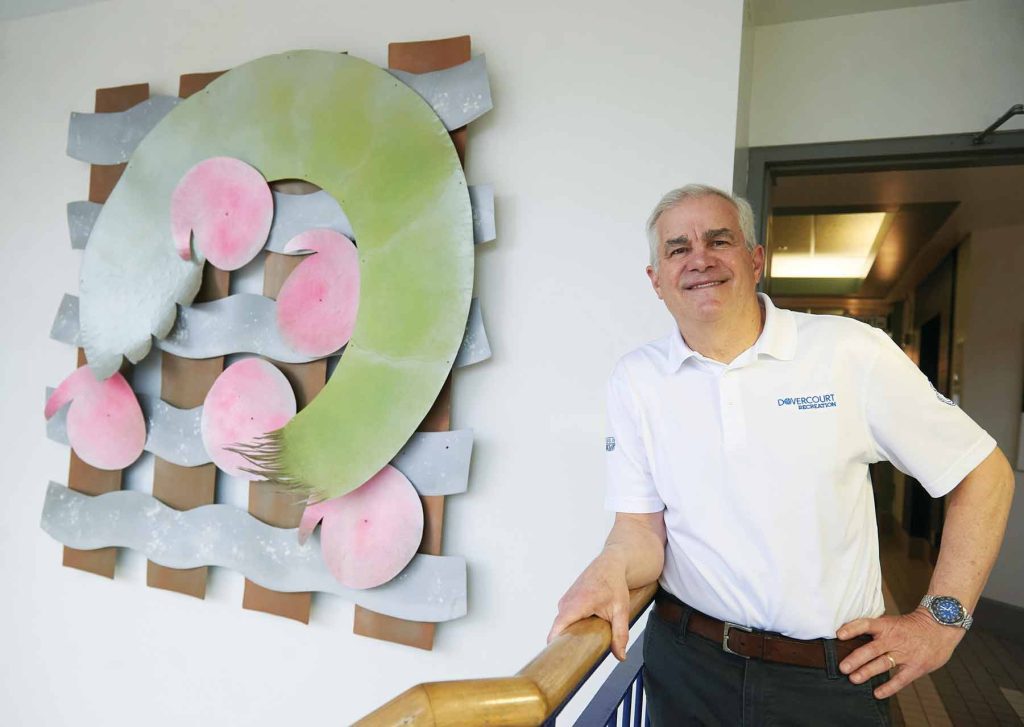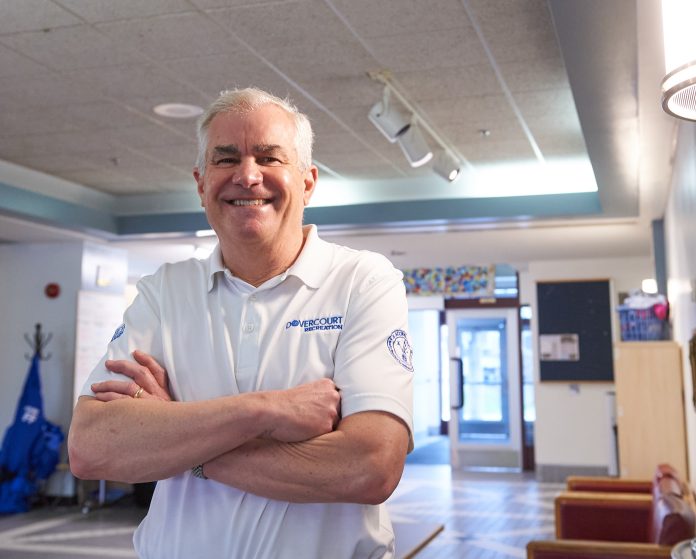By Maureen McEwan
It’s the end of an era at Dovercourt Recreation Centre. On May 31, after the annual general meeting, John Rapp will retire as executive director, a role he’s held since 1992.
“It seemed it was written in the stars because it was 30 years that I would have been at Dovercourt in April and I turned 65 last year,” he said.
“It just seemed like the right time to go, and I wanted to go soon enough that I could actually enjoy the next part.”
Growing up in Ottawa, Rapp has been a “recreation specialist” for most of his life.
“I started out as a lifeguard swimming instructor working for the City of Ottawa and progressed to being the program supervisor for aquatics in the city—I was in charge of beaches for some years. So my early involvement with Kitchissippi was in dealing with the community around Westboro Beach.”
In 1983, the City of Ottawa began to plan for a new community centre that would replace the Westboro Community Centre, according to Dovercourt’s website. The Dovercourt Recreation Association was heavily involved in the process, and when the new centre opened in 1987, Dovercourt became its manager through a service agreement.
When Rapp first heard the idea, he disapproved.
“I remember explicitly thinking that it was a really bad idea,” he admitted, laughing. “That the community could be in charge, and have the expertise, to run a community centre, especially when it involved a pool. As an aquatics person, I was going ‘this is pretty technical, I’m not sure a community can do that!’”
Little did he know, years later, Dovercourt would change his mind.
After working for the city, Rapp went to the University of Ottawa, where he earned a BA in communications, intending to step away from recreation and pursue a career in his new field.
But as he was graduating, he was headhunted to run a recreation centre—the Australian Water Safety Education Centre or “Dandenong Oasis”—in the Dandenong suburb of Melbourne.
It wasn’t completely out-of-the-blue: Rapp had previously worked in Australia on a one-year contract during Expo 88 in Brisbane. He accepted the two-year contract position and ran the recreation centre, hiring 250 staff.
Following his time in Dandenong, Rapp returned to Ottawa. It was 1992. He began applying for communications positions and found a job posting for executive director at Dovercourt.
“I thought, ‘well, if I’m going to work in recreation, at least let me work where they’re doing it the way I think it ought to be done, with the community in charge. As you can see, I’d had a change of heart,” he said, laughing.
“And wouldn’t you know it, that was the job I got,” he added.
It was a momentous year overall for Rapp. Months after he was hired as executive director in 1992, he and his wife were married and they bought a house. One year later, their son was born and then, two years later, their daughter.
When Rapp joined Dovercourt, the organization was finishing its first five years in operation and “hitting their stride in terms of stability.” He estimated that city funding made up 70 to 80 per cent of the centre’s operating budget in the first few years.
“Revenue was gradually growing, and the objective of the board when I got there was to decrease their dependence on municipal funding and, hence, increase their autonomy,” he said. “And so, from 1992, we just made deliberate efforts to really grow [programs] to suit the community.
“The result was, by 2019, we were generating $6 million of revenue and the city funding had dropped to less than eight per cent of our operating budget…it just became a revenue success story,” he added.

But then, the pandemic struck, and, like many recreation centres, Dovercourt faced hardships, including letting go of half their full-time workforce. Rapp said it was “heartbreaking,” as staff often grow up with Dovercourt, starting out as kids in programs and then working at the facility as teens and adults.
“Laying off half of them, [those were] probably the worst two years of my life,” he said.
Fortunately, Dovercourt is now “bouncing back,” Rapp said, adding that he made certain the organization was recovering before leaving his role.
“Our revenue is already greater than funding in this year, so we will be back where we were probably by 2023 or 2024, in terms of being a highly successful social enterprise.”
Looking back, something that Rapp is proud of is Dovercourt’s commitment to inclusion and accessibility.
“It is a fully integrated operation, which means that every program and service we offer excludes no one—all ages and abilities.”
“Most agencies ask people with special needs to fill out a questionnaire before they decide if they can serve them or not. What we do is we say ‘yes, sign up for the program. Now, tell us what we need to do to make you succeed.’”
The approach has created programs like Camp Buddies. Similar to the mentorship organization Big Brothers, Big Sisters, Dovercourt trains staff to help individual kids that need added support in camps, which Rapp said has been successful in assisting children and their families.
“Every day, it’s those little victories,” he said, adding that Dovercourt has a “fairly integrated staff as well.”
“That’s a highlight every day, to see every age and every ability every day in the centre.”
In retirement, he plans to do some things he loves, like consulting on strategic planning with different agencies, and doing leadership training and teaching with the LifeSaving Society.
And he’s eager to spend time with family and make time for his own recreation, including camping trips this summer.
“I bought a vintage motorhome that we’ve been restoring. And any time you buy a vintage vehicle, it means you’re going to spend a lot of time fixing stuff,” he said.
Dovercourt has begun searching for Rapp’s replacement; he expects them to hire in a matter of weeks.
As his time as executive director ends, Rapp doesn’t have any regrets as it has been a “very fulfilling” experience.
“It’s great to work in a place where attitudes and ideals are shared, and that’s been true of the team that I have,” he said. “So, when I say that we tend to say ‘yes’ to great ideas, that’s not just me—that’s endemic to the board and to the staff as well.”
He said he’s had as much fun as he has because of the people—the clients, volunteers, staff and community partners.
“I’ve made lifelong friends there that I expect I’ll keep.”
